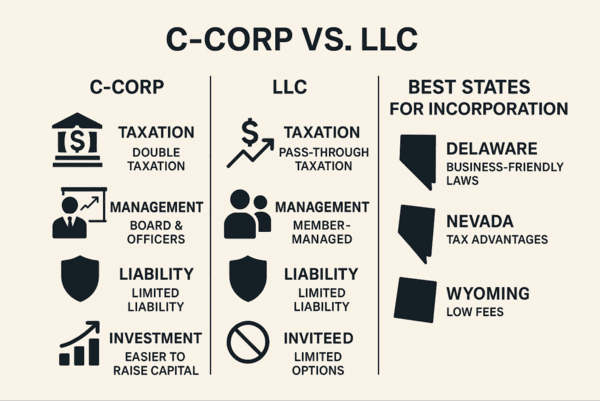
I’ve been discussing this a lot with startup founders recently, so I wanted to share a quick primer on when to consider forming an LLC vs. a C Corp (and whether to form the C Corp in Delaware). Here’s the breakdown:
VC Funding Factor (Start Here):
If you’re planning on pursuing traditional VC funding, you’ll (eventually) need to convert to a C Corp (and really a Delaware C Corp) because VCs will require it.
Not sure about pursuing traditional VC funding? You can always start as an LLC with the tax benefits it offers (more on this below) and then, if a VC wants to invest, you can convert to a Delaware C Corp at the closing of a SAFE or Series Seed round. This is very doable and VCs accept this most of the time, but note that your existence as an LLC can create a bit of a question mark in the minds of VCs as to whether you are serious about creating a venture-grade startup, so it can become an "optics" hurdle to go into VC fundraising efforts as an LLC.
If you really are not trying to attract traditional venture capital with a business model that is designed to scale like mad to gain market share fast, and if you really just want to start a solid cash flowing business that can indeed be very successful and profitable, then form an LLC.
If you are not totally certain, but think it is very likely that you will be targeting traditional VC for funding, I would say form as a C Corp. There are switching costs to being an LLC and then converting later, namely the legal expenses of putting together the conversion documents, but also I have seen it before where a startup invests a fair amount in a custom operating agreement and things like a phantom equity plan or profits interest plan to incentivize employees (like stock options but for LLCs) only to eventually throw all of that effort/money away upon conversion to a C Corp. Going straight to a C Corp can avoid this waste.
Talent Attraction Factor:
C Corps allow you to offer stock options to employees, which is a major draw when building a team (via platforms like Carta - designed for C Corps). While LLCs can offer similar things like “phantom equity” or "profits interest units" (and this can certainly make sense), this requires more explanation and complexity for potential hires than the more familiar concept of stock options. And because you can't use platforms like Carta for profits interest units and phantom equity, it is harder to scale and track these incentives with their vesting schedules, etc.
Structure Factor:
C Corps offer a consistent and well-known structure. LLCs provide infinite flexibility and customizability in operating agreements, which can be good but also introduces complexity, particularly for investors that usually like apples-to-apples comparisons in entity structures (versus having to review operating agreements in LLCs with a more careful eye for oddities).
Tax Factor:
LLCs = single taxation (profits taxed only at individual members’ level as pass-through income).
C Corps = double taxation (on corporate profits + dividends to shareholders).
BUT... QSBS! C Corps offer Qualified Small Business Stock (QSBS) benefits, allowing stockholders to exclude up to 100% of gains from federal capital gains taxes if held for 5+ years. This can be a game changer and arguably levels the playing field between LLCs and C Corps, but you do have to hold your stock for 5 years before QSBS matters.
Converting from LLC to C Corp:
If you do form as an LLC and want to change to a C Corp later, what is "conversion"?
In 40+ states, statutory conversion laws allow you to convert without liquidating assets or starting a new C Corp. Conversion allows for a quick and tax efficient way to change from an LLC to a C Corp. Usually takes a couple thousand dollars in legal fees.
Why a Delaware C Corp:
VCs often demand a Delaware C Corp first because there is a bit of a "network effect" in the VC community in which VCs and their lawyers have come to understand the Delaware General Corporation Law (DGCL) and don't want to have to consider different state laws every time they are contemplating investing in a startup. So it's best to avoid cutting against this grain as a startup even if it feels a bit odd (it is - but that's network effects for you).
But, there are substantive reasons for investors preferring Delaware too. The Delaware General Corporation Law is very well established and refined by time and battle and the Delaware Court of Chancery has tons of case-law / precedent to be able to resolve any corporate dispute quickly.
The DGCL is generally viewed as offering greater flexibility in corporate governance structures, investor rights, and transactional arrangements than other state laws. States like Washington have adopted the Model Business Corporation Act (MBCA), which certainly has similarities to the DGCL, but is not the same and is based on a different framework. The MBCA has some advantages - it offers greater clarity and uniformity than the DGCL. The difference between the DGCL and MBCA isn't really a "reason" to become a Delaware corporation, but perhaps more of an explanation of how Delaware's DGCL is different and has created a "network effect" and "stickiness" in the startup and investor ecosystem. And while you can argue about the logic of this stickiness, I usually advise my clients to simply go with the flow here. So if you are becoming a C Corp to attract VC investment, just accept that becoming a Delaware C Corp will raise fewer questions among VCs and is worth it for that reason alone.
Feel free to reach out if you want to discuss whether becoming an LLC or C Corp makes more sense for your startup. You can email me at brooks@lightlegal.com or book a Zoom meeting with me here: https://calendly.com/lightlegal/legal-services-meeting